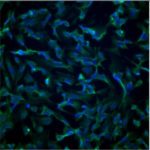Lien vers Pubmed [PMID] – 25406944
J. Med. Chem. 2015 Mar;58(6):2569-83
DNA methylation is a mammalian epigenetic mark that is involved in defining where and when genes are expressed, both in normal cells and in the context of diseases. Like other epigenetic marks, it is reversible and can be modulated by chemical agents. Because it plays an important role in cancer by silencing certain genes, such as tumor suppressor genes, and by reactivating other regions, such as repeated elements, it is a promising therapeutic target. Two compounds are already approved to treat hematological cancers. Many efforts have been carried out to discover new molecules that are able to efficiently inhibit DNA methylation in cancer cells. We will briefly overview the foremost of these efforts by focusing on what we have learned to this point on non-nucleoside inhibitors and on what we consider to be the features of an ideal inhibitor.

